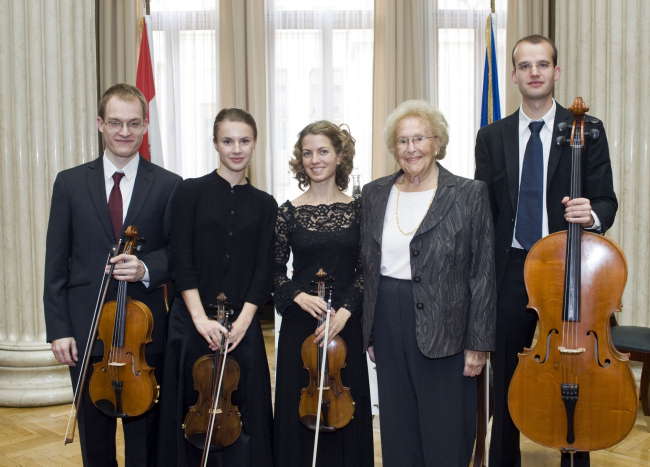VIENNA (AP) ― It was 1947 in post-war Vienna, and Hilde Zadek remembers taking a deep breath behind the curtain. A rookie on her first opera gig, she was about to sing the prestigious role of Aida for an audience full of particularly harsh critics ― whistle-packing Nazis she says were determined to show “that Jew from Palestine’’ she was not welcome at one of the world’s greatest opera houses.
But their whistles stayed silent, as Zadek celebrated her first on-stage triumph.
“At the end even they applauded and were my fans,’’ recalls the 95-year diva with a chuckle, as she recounts a life of improbable turns from the time she fled Nazi Germany to that first performance in Vienna that launched the former shoe sales clerk’s stellar opera career.
Sixty-five years later, Vienna has morphed from what she calls a post-war “nest of Nazis’’ replete with die-hard Hitler supporters into a city that has worked to reckon with its past. Austria’s capital has compensated thousands of relatives of Holocaust victims and frequently honors their memory. After decades or denial, Vienna’s municipal government now freely recognizes that the city ― and the nation ― were Hitler’s eager accomplices.
As for Zadek, the city she once despised as part of Hitler’s evil empire has long become a home she says she would never leave ― and one that is proud to call her its own. She has been showered with medals, granted high honorary titles and a singer’s competition named after her 13 years ago has turned into an international launching pad for future opera stars.
 |
In this Aug. 31 photo provided by the Austrian parliament, 95-year-old soprano Hilde Zadek (second from right) poses with musicians of the Tritonius Arts Quartet after being awarded with the Great Medal of Honor of the Austrian Republic at the parliament in Vienna. (AP-Yonhap News) |
“I live the life,’’ she exults, eyes twinkling behind rimless glasses as she serves coffee in her high-ceilinged apartment at Vienna’s tony 19th district. “I don’t feel a trace of anti-Semitism. And I have long forgiven ― Vienna was a wonderful audience from the first moment on.’’
With even Viennese Nazi sympathizers charmed by that first performance, Zadek was unstoppable. By the time she stopped singing and turned to teaching in 1971, the spunky soprano was one of the world’s leading divas, with 60 roles under her belt and thousands of appearances at the world’s greatest opera houses. She still teaches today, equating voice coaching with a personal mission to pass on what she knows to a new generation.
“If I had to give an accounting of myself up above and were asked ‘what have you achieved,’ then I would say, ‘I have trained good voice teachers,’’’ she says.
The way to Vienna and operatic stardom was perilous.
It began in 1934, in Poznan. Now Polish, the city was then part of Germany, and like other German communities it was gripped by growing anti-Semitism that made life more and more intolerable for Jews.
“I was told often enough what a Jew is, including that they had deformed brains,’’ she said. Kids were taken on school outings to see the Fuehrer and on one such occasion “I had the ‘privilege’ of seeing Herr Hitler, the ‘joy’ of breathing in his aura ― an ugly little gnome who did nothing else but scream with a face contorted by hate!’’








